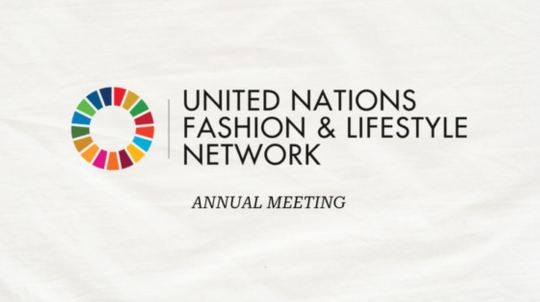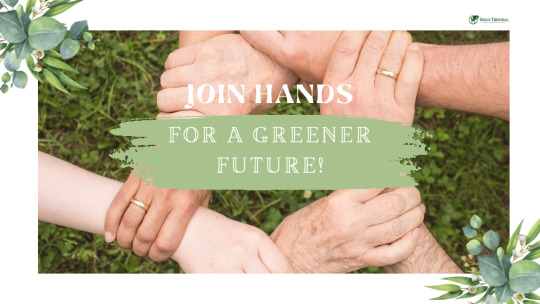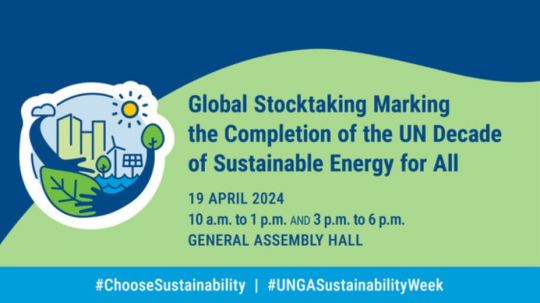#stakeholder partnerships
Text
(Part 2) Global stocktaking marking the completion of the UN Decade of Sustainable Energy for All to further accelerate the implementation of SDG 7 of the 2030 Agenda for Sustainable Development - General Assembly, Sustainability Week, 78th session.
Thematic Debate 2: Addressing energy's interlinkages and strengthening means of implementation and partnerships
Closing segment
Energy is an essential ingredient for getting the world on track towards meeting the SDGs and the objectives of the Paris Agreement on climate change. SDG 7, which calls for access to affordable, reliable, sustainable and modern energy for all, is inextricably linked to many other SDGs and its targets, including poverty eradication, food security, health, education, prosperity, gender equality, employment, transport, ocean, clean water and sanitation, as well as gender equality and the empowerment of women, youth and children.
The global stocktaking will bring together high-level representatives from Member States and other leaders from all regions. The meeting will be open to the United Nations system, ECOSOC-accredited non-governmental organizations, and other relevant stakeholders.
The goal of the global stocktaking is to review progress achieved at the end of the UN Decade of Sustainable Energy for All, 2014-2024, and to raise ambition and accelerate action towards attaining SDG 7 by catalyzing innovative solutions, investments and multi-stakeholder partnerships.
Watch the (Part 2) Global stocktaking marking the completion of the UN Decade of Sustainable Energy for All to further accelerate the implementation of SDG 7 of the 2030 Agenda for Sustainable Development - General Assembly, Sustainability Week, 78th session.


#high-level representatives#UN Economic and social council#ungasustainabilityweek#choosesustainability#UNGA78#decade of sustainable energy for all#SE4LL#ChooseSustainability#energy sector#energy security#energy services#ReliableEnergy#stakeholder partnerships#stakeholders#greenenergy#partnerships#sdg7#energy#innovative solutions#PowerGrid#electricity#investment#sustainable energy#affordable energy#clean energy#energy transition
0 notes
Text
United Nations Fashion and Lifestyle Network Annual Meeting.
The third edition of the UN Fashion and Lifestyle Network annual meeting, jointly organized by the United Nations Office for Partnerships and the Fashion Impact Fund, stands as a crucial milestone in advancing collaborations within the fashion and lifestyle sectors.
Bringing together advisory committee members, registered partnerships, industry stakeholders, leaders, media, and UN representatives, the meeting serves as a pivotal platform for showcasing impactful actions and progress. The overarching objective is to increase sector engagement in the implementation of the Sustainable Development Goals (SDGs), recognizing the profound influence of these sectors on societies and the environment.
This year's gathering will focus on key sectors such as fashion, home, textiles, jewelry, luxury, and travel which will help strengthen the promises of the SDGs, striving for global transparency, inclusivity, and sustainable transformation.
Related Sites and Documents
Concept Note.
Watch the United Nations Fashion and Lifestyle Network Annual Meeting!

#fashion & Lifestyle#annual meeting#global goals#unhq#United Nations Office for Partnerships and the Fashion Impact Fund#sustainable transformation#advisory committee members#registered partnerships#industry stakeholders#textile industry#fashion industry#travel industry#luxury sector
0 notes
Text
Speak out and share ideas that could contribute to the Pact for the Future negotiations, in line with SDG 17 and the Common Agenda's vision of networked multilateralism.
The 2024 United Nations Civil Society Conference will provide an opportunity for multi-stakeholder engagement ahead of the Summit of the Future and a venue for civil society to participate in the preparations process. The conference will provide civil society with an additional platform to speak out and share ideas that could contribute to the Pact for the Future negotiations, in line with SDG 17 and the Common Agenda's vision of networked multilateralism.
Watch the 2024 UN Civil Society Conference Town Hall.

#multi-stakeholders#Summit of the Future#civil society organizations#United Nations Civil Society Conference#conference#sdg17#partnership#UNwithCivilSociety#2024UNCSC#multilateral cooperation
0 notes
Text

#parceria#cases de marketing#marketing de parceria#marketing de stakeholders#stakeholdermarketing#stakeholders marketing#stakeholder's marketing#partner marketing#partnership#partnership marketing
0 notes
Text
One World, Shared Goals: Collaborative Actions for SDG Implementation.
Bringing partners from the education sector, private industry, government, children, youth, and student organizations. Together, they will explore the best practices for building effective partnerships to speed up the SDGs implementation.
Side Event at the SDG Action Weekend organized by Permanent Mission of the Federal Republic of Germany to the United Nations in New York/Planning Institute of Jamaica/HH MSII SDG Challenge/UNESCO IESALC/UN MGCY/ Danish UN Youth Delegation / Future Perspectives/ German UN Youth Delegation/ Global Student Forum/Global Youth Biodiversity Network/One Million Teachers/UNESCO SDG4 Youth and Student Network/Save the Children/Stakeholder Group of Persons with Disabilities/The Millennials Movement/World Food Forum/.
To maximize the SDG Summit's impact, the Secretary General is convening an SDG Action Weekend, which will generate opportunities for stakeholders, UN entities, and Member States to convene inside the United Nations Headquarters and set out specific commitments and contributions to drive SDG transformation between now and 2030.
The SDG Action Weekend will consist of the SDG Mobilization Day on Saturday, 16 September, and the SDG Acceleration Day on Sunday, 17 September at UNHQ in New York.
The SDG Action Weekend includes a select number of high-level side-events identified through an open call that concluded in August. They are jointly organized by coalitions of Member States, UN agencies and other international organizations, and global stakeholder networks.
#effective partnership#sdg17#SDG Action#agenda 2030#sustainable development goals#global goals#side event#global partnerships#Permanent Mission of the Federal Republic of Germany to the UN#Planning Institute of Jamaica#UNESCO IESALC#Major Group on Children and Youth#Global Youth Biodiversity Network#UNESCO SDG4 Youth and Student Network#The Millennials Movement#One Million Teachers#stakeholders#member states#united nations entities#Side event
0 notes
Text
Advancing the Sustainable Development Goals (SDGs) through the Youth, Peace and Security (YPS) agenda at the Local Level.
This Side event will provide a space for an intergenerational exchange reflection aimed at gathering experiences, challenges, and lessons learned in supporting young people's contribution to peace through the advancement of the SDGs.
Side Event at the SDG Action Weekend organized by France, the Dominican Republic, UNFPA, UNHCR, United Network of Young Peacebuilders (UNOY), Global Partnership for the Prevention of Armed Conflict (GPPAC).
To maximize the 2023 SDG Summit's impact, the Secretary General is convening an SDG Action Weekend, which will generate opportunities for stakeholders, United Nations entities, and Member States to convene inside the United Nations Headquarters and set out specific commitments and contributions to drive SDG transformation between now and 2030.
The SDG Action Weekend will consist of the SDG Mobilization Day on Saturday, 16 September, and the SDG Acceleration Day on Sunday, 17 September at UNHQ in New York.
The SDG Action Weekend includes a select number of high-level side-events identified through an open call that concluded in August. They are jointly organized by coalitions of Member States, UN agencies and other international organizations, and global stakeholder networks.
#Youth Peace and Security (YPS)#Sustainable Development Goals#young people#peace and security#sdg16#sdg action#2030 agenda#UNFPA#UNHCR#United Network of Young Peacebuilders (UNOY)#Global Partnership for the Prevention of Armed Conflict (GPPAC)#Side event#stakeholders#member states#United Nations entities
0 notes
Text
Catalyzing Transformative Change: Science, Academia and the Journey to 2030.
The objective of the side-event is to identify and promote concrete opportunities and partnerships for science and academia to accelerate transformations in high impact areas for implementing the 2030 Agenda for Sustainable Development.
Lead Facilitators:
UN DESA, in collaboration with:
Sustainable Development Solutions Network (SDSN)
International Science Council (ISC)
World Meteorological Organization (WMO)
United Nations Development Programme (UNDP)
Representatives of the Secretary-General's 10-Member-Group of High-level Representatives of Civil Society, Private Sector and Scientific Community to support the UN Technology Facilitation Mechanism
The 2030 Agenda for Sustainable Development stands as a ground-breaking global roadmap for addressing the most pressing challenges facing humanity. At the half-way point to 2030, science, technology and innovation hold enormous promise for enabling the kinds of transformations needed to accelerate progress on the Sustainable Development Goals (SDGs) –in energy systems, food systems, education, digital infrastructure, just economies, nature and the global commons and other crucial areas as indicated in the Special Edition of the SDG Report and the Global Sustainable Development Report. Addressing institutional and other barriers to knowledge and technology sharing and revolutionizing science, technology and innovation (STI) for sustainability can support a global enabling environment for the SDGs complementing financial reforms and a surge in SDG financing.
The objective of the event is to identify and promote concrete opportunities and partnerships for science and academia to accelerate transformations in high impact areas for implementing the 2030 Agenda for Sustainable Development. By bringing together policymakers, researchers, academics, and other stakeholders, the event will foster dialogue, share best practices and identify actionable strategies to advance the implementation of the SDGs. The event will also aim to help advance commitments in the SDG Summit Political Declaration for bridging the science, technology and innovation divides and supporting the responsible use of science, technology, and innovation as drivers of sustainable development.
---
To maximize the SDG Summit's impact, the Secretary General is convening an SDG Action Weekend, which will generate opportunities for stakeholders, UN entities, and Member States to convene inside the United Nations Headquarters and set out specific commitments and contributions to drive SDG transformation between now and 2030.
The SDG Action Weekend will consist of the SDG Mobilization Day on Saturday, 16 September, and the SDG Acceleration Day on Sunday, 17 September at UNHQ in New York.
The SDG Mobilization Day (16 September) will create an opportunity for stakeholders from all sectors to convene inside the United Nations Headquarters and mobilize towards an ambitious SDG Summit and UN General Assembly High-Level Week.
The SDG Acceleration Day (17 September) will be centred around the UN High-Impact Initiatives
The SDG Summit on 18-19 September will mark the mid point of the SDGs. It must secure the breakthroughs and momentum needed to change course and achieve the SDGs by 2030. To maximize the Summit's impact, the Secretary General is convening an SDG Action Weekend, which will generate opportunities for stakeholders, UN entities, and Member States to convene inside the United Nations Headquarters and set out specific commitments and contributions to drive SDG transformation between now and 2030.
#revolutionizing science#technology and innovation (STI)#knowledge and technology sharing#Sustainable Development Solutions Network (SDSN)#International Science Council (ISC)#United Nations Development Programme (UNDP)#World Meteorological Organization (WMO)#Partnership for science#science#academia#sdg4#stakeholders#SDG Action#agenda 2030#responsible use#innovation#plenary sessions
0 notes
Text
Unleashing the Power of Partnerships: Goal 17 and the Path to Global Transformation

In today's interconnected world, achieving sustainable development requires a collaborative and inclusive approach. Among the 17 Sustainable Development Goals (SDGs) set forth by the United Nations, Goal 17 stands out as a catalyst for progress. "Partnerships to achieve the Goal" is not just a goal in itself; it is the driving force behind the successful implementation of the other 16 goals. This article delves into the significance of Goal 17 and explores the transformative potential of partnerships in addressing the world's most pressing challenges.
The Foundation of Goal 17: Partnerships for Sustainable Development
Goal 17 stands as a powerful reminder that the challenges we face in the pursuit of sustainable development are multifaceted and interconnected. No single organization or entity possesses all the resources, expertise, or perspectives needed to tackle these complex issues alone. The recognition of this reality is the cornerstone of Goal 17, which underscores the importance of multi-stakeholder partnerships.
Partnerships for sustainable development bring together governments, businesses, civil society, academia, and individuals in a collaborative effort to address the world's most pressing problems. These partnerships are characterized by their inclusivity and the diversity of stakeholders involved. Each stakeholder brings unique perspectives, knowledge, skills, and resources to the table, creating a synergistic environment where collective action can thrive.
Public-private partnerships are a vital component of sustainable development partnerships. By forging alliances between the public and private sectors, these partnerships harness the resources and expertise of both to drive positive change. Governments provide regulatory frameworks, policy support, and funding, while businesses contribute innovative solutions, technological advancements, and financial resources. Together, they can implement sustainable practices, create sustainable business models, and promote responsible investment.
International cooperation is another crucial aspect of Goal 17 partnerships. Global challenges require global solutions, and cross-border collaborations are essential to address issues that transcend national boundaries. International partnerships foster knowledge exchange, shared learning, and joint action to tackle common problems such as climate change, biodiversity loss, and poverty. These partnerships enable countries to work together, pool resources, and align their efforts to achieve sustainable development on a global scale.
Knowledge-sharing networks play a pivotal role in partnerships for sustainable development. These networks facilitate the exchange of information, expertise, and best practices across different sectors and regions. By sharing knowledge and lessons learned, partners can avoid duplication of efforts, accelerate progress, and implement evidence-based solutions. Knowledge-sharing networks also promote innovation and foster a culture of continuous learning, driving the development and adoption of sustainable technologies, practices, and policies.
Capacity-building initiatives are integral to partnerships for sustainable development. They aim to strengthen the skills, knowledge, and capabilities of individuals, organizations, and communities to contribute effectively to sustainable development efforts. Capacity-building initiatives encompass training programs, workshops, mentorship, and skill-sharing activities. By investing in capacity building, partnerships empower stakeholders to take ownership of sustainable development initiatives, driving long-term impact and sustainability.
One of the significant advantages of partnerships for sustainable development is their ability to foster innovation. When diverse stakeholders collaborate, they bring together different perspectives, experiences, and expertise. This diversity sparks creativity and innovation, leading to the development of novel approaches, solutions, and technologies. Innovation, in turn, drives progress and propels sustainable development forward by addressing complex challenges in new and transformative ways.
Partnerships also enhance the efficiency and effectiveness of sustainable development efforts. By pooling resources, sharing costs, and leveraging expertise, partnerships optimize the use of available resources. This efficiency translates into a greater impact on the ground, as projects and initiatives benefit from shared knowledge, experience, and funding. Partnerships allow for economies of scale, enabling the replication and scaling up of successful models and interventions.
Moreover, partnerships for sustainable development generate meaningful impact at multiple levels. They operate at the local, national, and global levels, ensuring that no community or region is left behind. At the local level, partnerships address specific challenges faced by communities, tailoring interventions to their unique context and needs. Nationally, partnerships enable governments to align policies and strategies with sustainable development objectives, leveraging the resources and expertise of diverse stakeholders. Globally, partnerships contribute to the achievement of the Sustainable Development Goals as a collective effort, promoting global solidarity and collaboration.
In conclusion, Goal 17 recognizes the essential role of partnerships in achieving sustainable development. These partnerships bring together governments, businesses, civil society, academia, and individuals in a collaborative endeavor to address complex global challenges. By leveraging collective knowledge, resources, and expertise, partnerships foster innovation, enhance efficiency, and generate meaningful impact at local, national, and global levels. Through public-private partnerships, international cooperation, knowledge-sharing networks, and capacity-building initiatives, partnerships for sustainable development are driving positive change and paving the way for a more sustainable and inclusive future.
Enhancing Collaboration for Sustainable Development
Goal 17 serves as a call to action for governments, businesses, and individuals to join forces and collaborate effectively. Through collaboration, the barriers to achieving the other goals can be overcome. Here are some key aspects of collaboration under Goal 17:
Government Partnerships: Governments play a crucial role in fostering partnerships by creating an enabling policy environment, promoting transparency, and mobilizing resources. They can establish regulatory frameworks, incentivize private sector engagement, and prioritize sustainable development in national agendas.
Business Engagement: Businesses are key players in advancing sustainable development. Through corporate social responsibility initiatives, ethical practices, and responsible investment, businesses can align their objectives with the SDGs. By partnering with governments and civil society organizations, businesses can leverage their expertise, technology, and resources to drive sustainable solutions.
Civil Society Engagement: Civil society organizations are essential in driving social change and holding governments and businesses accountable. Their active participation in partnerships ensures that decisions are inclusive, responsive to community needs, and promote social justice. Civil society organizations can bring grassroots knowledge, advocacy skills, and community engagement to the table.
Unlocking the Transformative Potential
Goal 17 serves as a powerful enabler of change, unlocking the transformative potential of partnerships in several ways:
Knowledge Sharing and Capacity Building: Partnerships facilitate the exchange of knowledge, expertise, and best practices. They provide opportunities for capacity building, technology transfer, and learning from successful models. This exchange enhances the effectiveness and efficiency of interventions, avoiding duplication of efforts and accelerating progress.
Resource Mobilization: Achieving the SDGs requires significant financial resources. Partnerships enable resource mobilization by leveraging public and private investments, philanthropic contributions, and innovative financing mechanisms. By pooling resources and aligning priorities, partnerships can address financing gaps and scale up impactful projects.
Innovation and Technology Transfer: Partnerships foster innovation by bringing together different sectors and disciplines. Collaborations between academia, research institutions, and businesses drive technological advancements, research breakthroughs, and sustainable solutions. Technology transfer from developed to developing countries through partnerships promotes inclusive growth and bridges the digital divide.
Successful Examples of Goal 17 Partnerships
Numerous partnerships have emerged in recent years, exemplifying the transformative power of Goal 17. Some notable examples include:
The Global Fund to Fight AIDS, Tuberculosis, and Malaria: This public-private partnership has mobilized billions of dollars to combat the three diseases. It brings together governments, private sector entities, and civil society organizations to support prevention, treatment, and advocacy efforts worldwide.
The Sustainable Energy for All Initiative: Led by the United Nations, this partnership aims to ensure universal access to affordable, reliable, and clean energy. It catalyzes commitments from governments, businesses, and civil society organizations, driving investments in renewable energy, energy efficiency, and sustainable infrastructure.
The Access to COVID-19 Tools Accelerator: In response to the global pandemic, this partnership was formed to accelerate the development, production, and equitable distribution of COVID-19 vaccines, diagnostics, and treatments. It brings together governments, international organizations, and private sector actors, emphasizing the importance of global collaboration in addressing health crises.
The Road Ahead: Amplifying Partnerships for Global Transformation
As we look toward the future, the significance of Goal 17 becomes even more apparent. Strengthening partnerships is essential to accelerate progress across all the SDGs and overcome complex challenges such as climate change, poverty, inequality, and conflict.
To amplify the impact of partnerships, several steps can be taken:
Policy Coherence and Alignment: Governments should align their policies, strategies, and funding mechanisms with the SDGs. This coherence ensures that national and international efforts are mutually reinforcing, enabling effective collaboration and resource mobilization.
Scaling Up Successful Models: Identifying and replicating successful partnership models can drive widespread change. Lessons learned from existing partnerships can inform the design and implementation of new collaborations, avoiding reinvention and optimizing impact.
Promoting Inclusive Partnerships: Partnerships must prioritize inclusivity and diversity. By involving marginalized communities, women, youth, and indigenous groups, partnerships can address systemic inequalities and ensure that no one is left behind in the journey towards sustainable development.
Conclusion
Goal 17, "Partnerships to achieve the Goal," acts as a linchpin for global transformation. By fostering collaboration, knowledge sharing, and resource mobilization, partnerships unlock the potential to address the world's most pressing challenges. Governments, businesses, civil society organizations, and individuals must come together to harness the power of partnerships and drive sustainable development forward. As we embark on this collective journey, Goal 17 reminds us that our shared future depends on the strength and effectiveness of our collaborations. Together, we can build a more equitable, resilient, and sustainable world for all.
#Sustainable development partnerships#Multi-stakeholder collaborations for Goal 17#Importance of partnerships in sustainable development#Public-private partnerships for sustainable development#International cooperation and Goal 17#Knowledge-sharing networks for sustainable development#Capacity-building initiatives in partnerships#Achieving the SDGs through partnerships#Collaborative approach to sustainable development#Innovative solutions through partnerships#Leveraging resources in sustainable development partnerships#Enhancing efficiency through partnerships#Local#national#and global impact of Goal 17 partnerships#Driving transformative change through partnerships#Inclusive partnerships for sustainable development#Partnership models for global transformation#Synergy in sustainable development partnerships#Achieving sustainable goals through collaboration#Harnessing collective knowledge in partnerships#Scaling up successful partnership models#Promoting responsible investment through partnerships#Cross-sector partnerships for Goal 17#Strategies for effective partnership building#Empowering communities through sustainable development partnerships#Partnership-driven innovation for the SDGs#Sustainable development and the power of collaboration#Building resilience through multi-stakeholder partnerships#Implementing Goal 17: Lessons from successful partnerships
1 note
·
View note
Text
Letter from the President of the General Assembly – New Partnership for Africa’s Development – NEPAD.
Interactive multi-stakeholder dialogue on the review of the implementation of commitments made towards Africa's development - General Assembly, 77th session.
#New Partnership for Africa’s Development – NEPAD#multi stakeholder#interactive dialogue#united nations general assembly#africa's development
0 notes
Text
WHO outlines 40 research priorities on antimicrobial resistance
WHO has published its first global research agenda for the world’s scientists to address the most urgent human health priorities to combat antimicrobial resistance (AMR). It outlines 40 research topics on drug-resistant bacteria, fungi and Mycobacterium tuberculosis that must be answered by 2030, in line with the Sustainable Development Goals.
The WHO Global Research Agenda for AMR in human…

View On WordPress
#AMR#Antimicrobial Resistance Multi-Stakeholder Partnership Platform#Antimicrobial Resistant#Global antimicrobial resistance and use surveillance system#News#Public Health#Public Health News#Public Health Update#Research Capacity Building
0 notes
Text
(Part 1) Global stocktaking marking the completion of the UN Decade of Sustainable Energy for All to further accelerate the implementation of SDG 7 of the 2030 Agenda for Sustainable Development - General Assembly, Sustainability Week, 78th session.
The goal of the global stocktaking is to review progress achieved at the end of the UN Decade of Sustainable Energy for All, 2014-2024, and to raise ambition and accelerate action towards attaining SDG 7 by catalysing innovative solutions, investments and multi-stakeholder partnerships.
Opening segment
Thematic Debate 1: Closing the energy access gap and transitioning to decarbonized energy systems
Energy is an essential ingredient for getting the world on track towards meeting the SDGs and the objectives of the Paris Agreement on climate change. SDG 7, which calls for access to affordable, reliable, sustainable and modern energy for all, is inextricably linked to many other SDGs and its targets, including poverty eradication, food security, health, education, prosperity, gender equality, employment, transport, ocean, clean water and sanitation, as well as gender equality and the empowerment of women, youth and children.
The global stocktaking will bring together high-level representatives from Member States and other leaders from all regions. The meeting will be open to the United Nations system, ECOSOC-accredited non-governmental organizations, and other relevant stakeholders.
(Part 1) Global stocktaking marking the completion of the UN Decade of Sustainable Energy for All to further accelerate the implementation of SDG 7 of the 2030 Agenda for Sustainable Development - General Assembly, Sustainability Week, 78th session.

#high-level representatives#UN Economic and social council#ungasustainabilityweek#choosesustainability#UNGA78#decade of sustainable energy for all#SE4LL#ChooseSustainability#energy sector#energy security#energy services#ReliableEnergy#stakeholder partnerships#stakeholders#greenenergy#partnerships#sdg7#energy#innovative solutions#PowerGrid#electricity#investment#sustainable energy#affordable energy#clean energy#energy transition
0 notes
Text
Andrew Sparke and QMines: Unleashing the Power of Advancements at Mt Chalmers
QMines, under the dynamic leadership of Andrew Sparke, has made significant strides in advancing the Mt Chalmers copper and gold mine. In just 18 months since listing, QMines has achieved remarkable resource upgrades, positioning itself as a key player in the mining industry. With a vision to unlock the full potential of Mt Chalmers, QMines is determined to establish a thriving copper and gold operation while prioritizing resource estimation, metallurgical testing, and environmental studies.
Delivering Resource Upgrades:
QMines' relentless pursuit of excellence has led to the successful delivery of the third and fourth resource upgrades at Mt Chalmers. These upgrades have propelled the measured, indicated, and inferred resources to an impressive 11.86 million metric tonnes at a remarkable 1.22% contained copper equivalent. Notably, 84% of these resources fall within the measured and indicated JORC categories, reflecting the high confidence level in the project's potential.
Unveiling the Deposits:
Mt Chalmers is home to four identified deposits, with Mt Chalmers and Woods Shaft already established as valuable resources. QMines is committed to converting the remaining two deposits, Botos and Mount Warminster, into resources, further enhancing the project's scale and viability. The exploration efforts aim not only to maximize the potential of existing deposits but also to unearth additional Volcanic-Hosted Massive Sulphide (VHMS) deposits, ensuring a sustainable supply of copper and gold.
Continued Exploration and Development:
QMines' unwavering dedication to the Mt Chalmers project extends into the future. Through 2023 and beyond, the company plans to intensify its exploration and development initiatives. Resource estimation will be refined to uncover untapped potential, while metallurgical testing will provide valuable insights into optimizing extraction processes. Environmental studies will be conducted in alignment with QMines' commitment to sustainable mining practices.
Engaging Stakeholders for Progress:
QMines recognizes the importance of collaboration in driving project development. Andrew Sparke and his team are actively engaging with potential investors, community stakeholders, and strategic partners to foster meaningful relationships. By involving all relevant parties, QMines aims to build a strong foundation for success, ensuring a positive impact on local communities and stakeholders.
Conclusion:
Under the visionary leadership of Andrew Sparke, QMines has achieved remarkable advancements at Mt Chalmers. With resource upgrades, an ambitious exploration agenda, and a commitment to sustainable practices, QMines is well-positioned to shape the future of copper and gold mining in the region. As the company continues to unlock the vast potential of Mt Chalmers, it stands as a testament to Andrew Sparke's expertise and QMines' dedication to innovation and responsible resource development.
#Andrew Sparke#QMines#Mt Chalmers#Resource Upgrades#Copper and Gold Mining#Exploration and Development#Metallurgical Testing#Environmental Studies#Sustainable Mining Practices#Stakeholder Engagement#Mining Industry#VHMS Deposits#Copper Equivalent#JORC Categories#Australian Mining#Resource Estimation#Community Impact#Investor Relations#Strategic Partnerships#Mining Project Management.
0 notes
Photo

#highereducation #conclave2023 in #partnership with #timesgroup and #Deloitte … #attended by #education #stakeholders of #UttarPradesh… with #dhirendrapalsingh sir #educationadvisor to Hon. CM, Dr. #sudhirbobde sir #PrincipalSecretary .. #thankyou to both sirs’! #lotstolearn https://www.instagram.com/p/CoPkgZKyuuS/?igshid=NGJjMDIxMWI=
#highereducation#conclave2023#partnership#timesgroup#deloitte#attended#education#stakeholders#uttarpradesh#dhirendrapalsingh#educationadvisor#sudhirbobde#principalsecretary#thankyou#lotstolearn
0 notes
Text
Become a partner and host a children’s take over!

. Together with the world’s leading companies, corporate foundations and private organizations, we harness our collective strengths to achieve the Sustainable Development Goals and help children survive, thrive and fulfil their potential.
#stakeholders#inclusion for children#action for children#private sector#world children's day#children's challenge#partnership#SDG17#Sustainable Development Goals
0 notes
Text

#pisadinha#stakeholders#b2b#b2b2c#marketplace#relacionamento com parceiros#martketing de parceria#marketing partnership market#magalu#magazineluiza#cases de marketing#marketing cases#vejapisadinha#avatar digital#avatar de marca#personificação da marca#avatarização de marca#avatarização da marca#brand avatar#brand digital influencer#digital influencer avatar
0 notes
Text
Promote and highlight the importance of sound policies, knowledge management, advocacy and multi-stakeholder partnerships.
In celebrating the World Youth Skills Day 2015 for the first time at the United Nations Headquarters, this special event will promote and highlight the importance of sound policies, knowledge management, advocacy and multi-stakeholder partnerships.
#knowledge management#multi-stakeholder partnerships#World Youth Skills Day#skills for work#wysd#15 july#panel discussion
1 note
·
View note